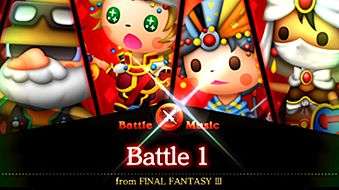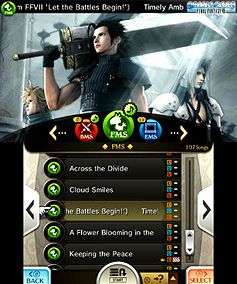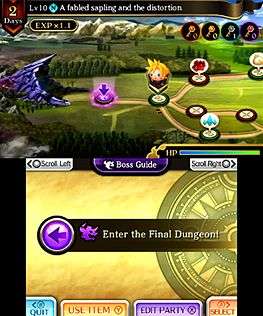Theatrhythm Final Fantasy: Curtain Call Interview with Producer Ichiro Hazama
by Edward
 When the original Theatrhythm caught my eye, I was more than drawn in by the premise of playing through an RPG dedicated to the iconic music from the Final Fantasy series. Two years and an iOS port later, it’s getting a sequel in the form of Curtain Call, which aims to be the final, definitive instalment based on the legendary franchise. I recently had the opportunity to speak to Theatrhythm producer Ichiro Hazama about his favourite songs, annoying people on aeroplanes, and the characters he most prefers to take on quests.
When the original Theatrhythm caught my eye, I was more than drawn in by the premise of playing through an RPG dedicated to the iconic music from the Final Fantasy series. Two years and an iOS port later, it’s getting a sequel in the form of Curtain Call, which aims to be the final, definitive instalment based on the legendary franchise. I recently had the opportunity to speak to Theatrhythm producer Ichiro Hazama about his favourite songs, annoying people on aeroplanes, and the characters he most prefers to take on quests.
The Final Fantasy series is one that’s always been praised for its music, so how did the idea of a game based entirely around it come about?
As you say, there are a lot of memorable and well-loved songs from the series but, as a creator, I only create games that I would like myself, or I’d be interested in. Personally, I’ve got very strong memories of playing Final Fantasy VI and remembering one particular song from that – Terra’s Theme. Remembering the images on the screen with that song and what it felt like is a really vivid memory for me, but everyone who enjoys the series will have at least one or two moments like that. So we knew if we could turn that into a game, then that’d be really amazing.
How did you decide the soundtrack, especially when so many iconic tracks were used in the first instalment?
One of the main changes and evolutions we’ve had is that the original only covered the numbered entries in the Final Fantasy series up to XIII. In Curtain Call, what we’ve done is we’ve tried to include – obviously XIV is out now so we’ve got that in there as well – songs from all the spin-offs and minor titles in the series. Now we’ve got XIII-2, Lightning Returns and other spin-offs like that, so that influenced the choices of what songs we used, because we wanted to include more songs from those titles. In addition, you’ll find that online there are a lot of fans who do their own rankings and polls about what people’s favourite songs are, and we carried out a few of those ourselves in the company. We used those to find out what the most popular songs and the fan favourites were.
 Did you ever feel compelled at any point to keep in tracks from the previous game?
Did you ever feel compelled at any point to keep in tracks from the previous game?
Some of the songs that were in there were very much my favourites, for example, we had the Final Fantasy X track To Zanarkand and from VII we had One Winged Angel, so obviously I wanted to keep those in as well. When I was thinking about what we wanted to do with the game and making it representative of the whole series, I felt we had to keep in all the old stuff from the previous game as well. Rather than add or remove anything we had to keep expanding it, and that’s why we included and kept in pretty much all of the old songs as well, rather than cutting them off. We felt that for it to be a complete game that we had to have all of them.
What specific lessons did you learn after developing the first game, as well as the fan feedback you received?
Rather than any specific technical points, it was the attitude and the approach in how to create the game was what we learned from making the original one. So, certainly, if we’d gone with something simple, like “let’s just create a game with all the Final Fantasy music” probably wouldn’t have had the same appeal or reaction from the fans that we got in the end. What we were really trying to do there and what we carried over when making Curtain Call was really trying to get the essence of the franchise, along with including elements that really are just Final Fantasy in there, and make something that really feels like part of the series.
How have you adapted the gameplay to fit in with using button controls this time, rather than playing with the touch-screen only?
I thought it would be a good idea; I myself wanted to do that somewhat, but really the idea came from the development company that we used for this one, IndieZero. They basically came to us and said “we’ve tried this out and created a button control system, what do you think of it?” and it seemed really good. This is a story I heard after we put it in the game, but one of the people who was helping us out, he was originally on the Final Fantasy XIV team, a guy called Murouchi, about how he was playing the original Theatrhythm on an airplane. While he was there he was using the touch-pad and he was clattering away and making a lot of noise and annoying the people around him until someone came up to him and asked “could you be a bit quieter or put that away?”, so I thought that yeah, it would probably be a good idea if we had a button system so you could play in those situations without annoying people. From my own perspective as well, if you want to relax a bit, or if you’re tired, you want to lie down and look up at the ceiling, and a touch-pad doesn’t necessarily work well there, but it’s those kind of situations we were aiming at.
There’s a new Quest mode that’s been added into Curtain Call, was this added specifically for replayability, or more to tell a story?
The idea is pretty much that you can play the same stages over and over again, because if you complete the first map then another one comes along, and as you play through you unlock more maps to travel through – it really was something to improve the longevity of the game. That’s one reason why we added it. There’s a lot of content in the maps as well, and you get many different kinds of maps, so some will give you a huge amount of experience points, or some will give you better rewards than others, and you might, for example, come across a map that consists of all the songs of one of the spin-off titles. Another thing you can do to enhance players getting together and exchanging information and playing the game together is being able to attach maps to your profile card, so you can swap around and play maps that other people have found, so it really does helps with interactivity between players, which is another reason why we included it.
 Considering that Theatrhythm was primarily a single-player game, how else have you made the idea of playing with others more compelling, besides from the ability to swap maps?
Considering that Theatrhythm was primarily a single-player game, how else have you made the idea of playing with others more compelling, besides from the ability to swap maps?
Obviously the profile card exchange is one aspect of how we try to get people to come together and play the game, but I think the main thrust of that is the new Versus mode that we’ve included this time. Being a rhythm game and the kind of game that it is, you can have some Versus battles with the kind of attitude that this is a serious duel between two people to see who is the better player. But really, the idea is that people who enjoy Final Fantasy’s music can come together and play in quite a light-hearted way, so the way the game is designed will affect that. After you’ve played a game against someone, you’ll automatically exchange profile cards and you can build up a network of friends with that – it’s all designed to enhance that kind of experience.
The first game saw a release on iOS as a Free-To-Play title with micro-transactions. If you were to port Curtain Call to that format again, would consider the same model as before, and was it successful the first time out?
Obviously at the moment we don’t have any concrete plans to port this to another platform, and it’s not something I’d personally be so interested in doing, but I think how to consolidate Curtain Call as a game and as an experience itself is the important thing we’ve got to work on now. When I talk about consolidating the game and making it a really complete experience, we talk about the new modes and that’s all very important, but I think one of the main things is the number of tracks in the game, and what we want to do is expand on that number by adding in more and more downloadable content tracks. If you do that on lots of different hardware you’ve got to do different ones for each hardware, so at the moment we want to get a really good experience with the original version by adding in more and more tracks. That’s our current aim with the game.
This is probably a cheeky final question to ask, but what’s your favourite party to run with in the game and why?
Ooh, that’s tough! [Laughs] You can check how many times you can use each character on the profile card screen, and I was quite intrigued to see which characters I used the most, but I think certainly there was Locke from Final Fantasy VI, and he was certainly the character I used the most. I think my usual party involves Locke and Terra from VI, and then Auron and Jecht from X. I think everyone’s got their favourites, and I think everyone’s going to be biased one way or another!
Theatrhythm Final Fantasy: Curtain Call will be released for the Nintendo 3DS on the 19th September 2014.
Last five articles by Edward
- Best of 2015: Journey's End: A New Beginning
- Journey's End: A New Beginning
- You Can't Choose Your Happy Ending
- Okay, Let's Fix Comedy In Games - The V-Effekt
- Time Keeps On Smashing Away





















There are no comments, yet.
Why don’t you be the first? Come on, you know you want to!